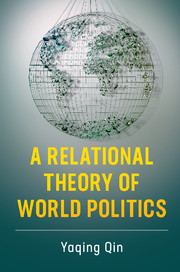Book contents
- A Relational Theory of World Politics
- A Relational Theory of World Politics
- Copyright page
- Contents
- Figures
- Tables
- Preface
- Acknowledgments
- Part I Culture and Social Theory
- Part II Relation and Relationality
- Part III Power, Cooperation, and Governance
- 8 Power and Relation
- 9 Cooperation in a Relational World
- 10 Governance: Rule, Rules, and Relations
- Bibliography
- Index
8 - Power and Relation
from Part III - Power, Cooperation, and Governance
Published online by Cambridge University Press: 03 April 2018
- A Relational Theory of World Politics
- A Relational Theory of World Politics
- Copyright page
- Contents
- Figures
- Tables
- Preface
- Acknowledgments
- Part I Culture and Social Theory
- Part II Relation and Relationality
- Part III Power, Cooperation, and Governance
- 8 Power and Relation
- 9 Cooperation in a Relational World
- 10 Governance: Rule, Rules, and Relations
- Bibliography
- Index
Summary
- Type
- Chapter
- Information
- A Relational Theory of World Politics , pp. 241 - 288Publisher: Cambridge University PressPrint publication year: 2018



